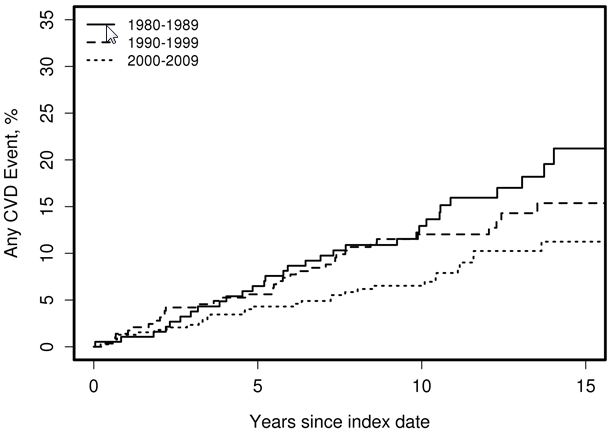Session Information
Date: Sunday, November 10, 2019
Title: 3S108: RA – Diagnosis, Manifestations, & Outcomes II: Cardiovascular Comorbidities (921–926)
Session Type: ACR Abstract Session
Session Time: 4:30PM-6:00PM
Background/Purpose: Increased burden of cardiovascular disease (CVD) in patients with rheumatoid arthritis (RA) as compared to the general population is well recognized. Several studies suggested reduced CVD mortality in RA in recent decades. Longitudinal studies on trends in occurrence of CVD events in RA patients over time are lacking. To address this gap in knowledge, we evaluated trends in incidence of CVD in patients with incident RA in 1980-2009.
Methods: We studied patients with incident RA (age >18 years, 1987 ACR criteria met in 1980-2009) followed until death, migration out of the region, or 12/31/2016. Follow-up of each decade was truncated to make the length of follow-up comparable (i.e., the 1980–89 cohort was truncated at December 31, 1996, the 1990–99 cohort was truncated at December 31, 2006 and the 2000–09 cohort was truncated at December 31, 2016). Incident CVD events included myocardial infarction (MI), stroke (ischemic or hemorrhagic), coronary heart disease (CHD) death and first occurrence of any of these. Patients with CVD events prior to RA incidence date were excluded. Cox proportional hazards models were used to compare incident CVD events by decade, adjusting for age and sex. Cumulative incidence of CVD events adjusted for death from other causes was calculated.
Results: The study included 906 patients with incident RA (mean age 55.9 years; 69% female). There were 201, 299 and 406 patients in 1980-89, 1990-99 and 2000-09, respectively. During median follow-up of 10.6, 10.4 and 10.2 years per decade of RA incidence, CVD events occurred in 31, 38, and 31 patients. Patients with incident RA in 2000–09 had markedly lower cumulative incidence of any CVD events than patients diagnosed in 1990s and 1980s (Figure). Hazard ratios (HR) for any CVD events demonstrated a temporal reduction in CVD events among patients with incident RA in 2000s compared with incident RA in 1980s (HR: 0.52; 95% confidence interval (CI): 0.32-0.86) and a reduction compared with incident RA in 1990s (HR: 0.65; 95% CI: 0.40-1.05).
Conclusion: The incidence of major CVD events in RA declined markedly over time. These findings may reflect increased awareness, improved primary CVD prevention and better RA disease management in recent years. More studies are needed to understand the determinants and implications of these data.
To cite this abstract in AMA style:
Myasoedova E, Davis J, Roger V, Achenbach S, Crowson C. Improved Incidence of Cardiovascular Disease in Patients with Incident Rheumatoid Arthritis in 2000s: A Population-Based Cohort Study [abstract]. Arthritis Rheumatol. 2019; 71 (suppl 10). https://acrabstracts.org/abstract/improved-incidence-of-cardiovascular-disease-in-patients-with-incident-rheumatoid-arthritis-in-2000s-a-population-based-cohort-study/. Accessed .« Back to 2019 ACR/ARP Annual Meeting
ACR Meeting Abstracts - https://acrabstracts.org/abstract/improved-incidence-of-cardiovascular-disease-in-patients-with-incident-rheumatoid-arthritis-in-2000s-a-population-based-cohort-study/

